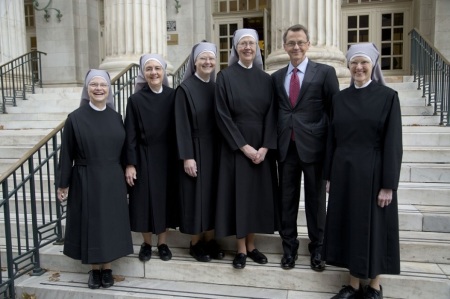Nun Too Crazy? Obama Trying to Hand Pick Opponent in Birth Control Battle, Little Sisters of the Poor Attorneys Say

The Becket Fund for Religious Liberty urged the U.S. Supreme Court on Tuesday to hear the Little Sisters of the Poor's religious freedom case against the intrusive accommodation to the Obamacare contraception mandate, a case the Department of Health and Human Services doesn't want the Court to take.
After the Eighth Circuit Court of Appeals struck down in September the legality of an HHS Affordable Care Act mandate accommodation that requires religious objectors to allow the government to pay health care providers to provide contraception and abortion-inducing drugs to their employees as part of their health plans, HHS sent a brief to the Supreme Court on Sept. 30 urging the court to resolve the question of whether the accommodation violates the Religious Freedom Restoration Act.
Although HHS admits that the Supreme Court should settle the RFRA issue, as there are seven related cases currently pending before the court, the Becket Fund accused HHS of trying to "hand-pick" its own opponent for the case in a reply brief submitted to the court on Tuesday.
The Little Sisters of the Poor, an order of Catholic nuns who serve the elderly, has been at the heart of opposition to the contraception mandate accommodation, which the organization believes still forces it to violate its religious beliefs or else be subject to pay ruinous fines to the IRS.
Although Little Sisters has long maintained its belief that the accommodation violates the organization's religious convictions because it requires the institution to be complicit in allowing the government to pay for birth control and abortifacients given to their employees and beneficiaires, the Tenth Circuit ruled against the organization earlier this summer and rejected the claim that the accommodation would violate the institution's religious rights.
Despite calling on the Supreme Court to settle the accommodation issue, HHS' Sept. 30 brief labeled the Little Sisters of the Poor as an "especially unsuitable vehicle" and urged the court not to hear the nuns' case but instead take on another RFRA case.
"After impermissibly trying to pick and choose which religious groups to exempt from the contraceptive mandate, HHS should not now be allowed to pick and choose its opponent or which questions it must confront in defending its actions," the Becket Fund brief states.
In making the argument for why the Supreme Court should hear the Little Sisters of the Poor case, the brief points out that not only does the Little Sisters case present an argument for how the accommodation violates RFRA, it also presents an argument for how the HHS accommodation violates the Little Sisters' First Amendment protection.
The brief explains that HHS is picking which religious organizations are granted an exemption from the mandate. Although Catholic dioceses are exempt from the mandate, for example, Catholic non-profits are not.
"HHS understandably would prefer not to have to explain to this Court how it is that the dioceses of the Catholic Church are entitled to an exemption from the contraceptive mandate while the Little Sisters are not, even though both unquestionably are religious organizations that share the exact same religious objection," the brief explains.
Becket Fund attorney Daniel Blomberg told The Christian Post that HHS' actions are equivalent to the agency telling non-profit ministries like Little Sisters and others that they are "not religious enough to merit First Amendment and RFRA protections."
"That is unprecedented and very dangerous to allow an agency, all by itself, decide who gets to exercise their faith and who doesn't," Blomberg stated. "They don't want to have to face the opponent that, among other things, has not just a RFRA claim but a constitutional claim that HHS is discriminating among religions in a way that violates the religion clauses of the First Amendment."
Blomberg added that Title XII already serves as a barometer to determine who deserves religious exemptions, yet HHS has ignored Title XII.
"Title XII has been around for decades and was established by Congress after a careful consideration," Blomberg explained. "Every one of the ministries that are in front of the Supreme Court right now would be protected."
"We shouldn't have this situation where the government is saying that the Little Sisters of the Poor, the nuns who have sworn obedience to the Pope and have been ministering to the poor for 175 years around the world, that they are not religious enough," Blomberg continued. "The HHS is doing that by ignoring the way that Congress has historically determined who gets protected from religious exemption rules."
Now lumped in with the Little Sisters of the Poor case is the petition of the Reaching Souls ministry, an international missionary organization, whose case against the mandate was heard by the Tenth Circuit at the same time as Little Sisters.
Bloomberg pointed out that a third party administrator for a health care provider was on the record in the Reaching Souls case as saying that if the government provides the money, the health care provider would provide the contraception and abortion-inducing drugs to the organization's employees and beneficiaries as young as 10 years old.
"It is in the record in that case, and it is very clear what is going to happen if the government succeeds at forcing these ministries to violate their faith," Blomberg said.





















